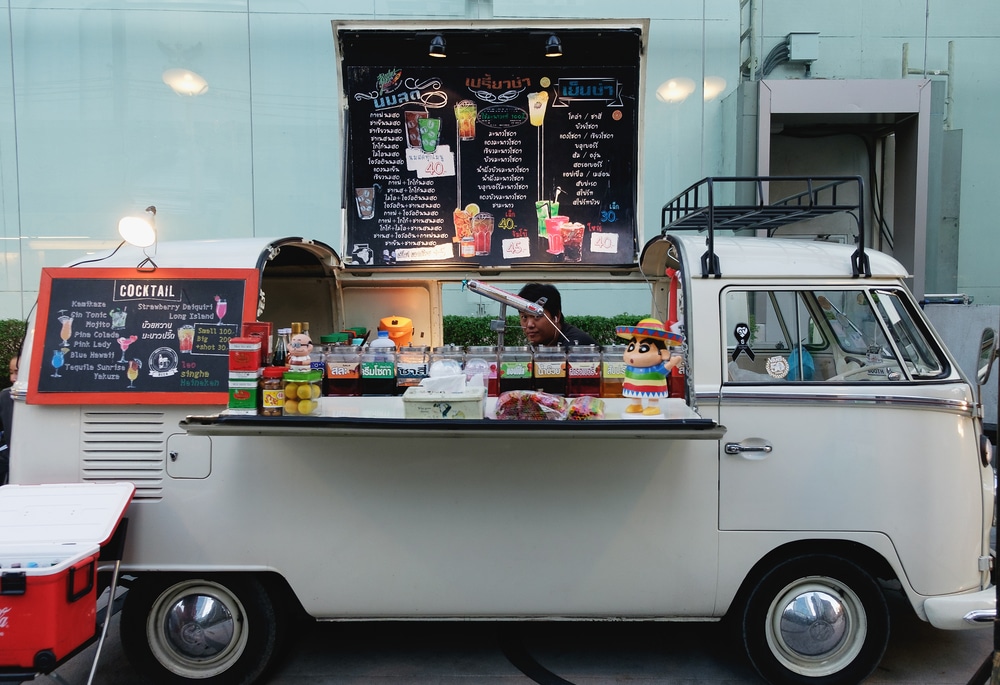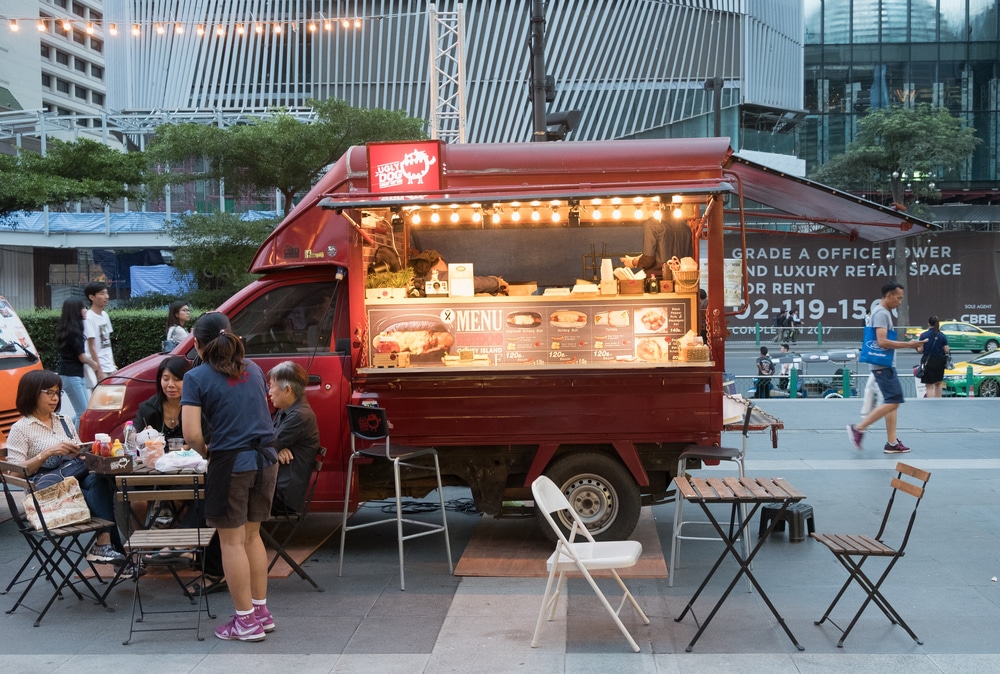Jasmine Birtles
Your money-making expert. Financial journalist, TV and radio personality.

After years of being somewhat snubbed, the mobile food business is making a massive comeback.
Visit any weekend market or merely walk down one of your city’s more pedestrian-friendly streets and you’re bound to encounter a collection of quaint and colourful carts, selling anything from seaweed wraps to samosas.
Apart from delicious and affordable wares, the growing trend also brings with it a range of exciting business opportunities.
Wondering if and how you can make money with a food truck of your own? We’ve got you covered!

If you have a solid business plan and a bit of start-up capital to work with, the rewards of the process will far outweigh the challenges.
Although you probably won’t become an instant millionaire, there are a myriad of reasons why your idea to make money with a food truck is worth investigating anyway.
Here are three big pros to consider:
Whilst we’d hardly say it’s entirely without hassles, with recurring costs over £7,000 a month when you factor in insurance, parking and fuel, setting up a food truck can be simple and doable – certainly more so than opening a restaurant or coffee shop. According to recent stats from Compare The Market, the total cost of a food truck (including upfront costs, recurring costs for the first month, and licensing) is £17,973 compared to £65,263 for a restaurant.
Your biggest initial expense will probably be finding an actual truck or cart from which to sell your goods and, of course, refitting it for your purposes. After this, you’ll obviously need to apply for appropriate licenses and – depending on when and where you operate – rental for your stand or lot.
Sure, it may all add up at first, but in the long run you’ll be saving on exorbitant property costs, building maintenance and pay checks for a large staff contingent.
One of the reasons food trucks have become so popular is the fact that they’re informal and inherently fun. In many ways, the best way to make money with a food truck is to really enjoy what you do. A passion for your business will ensure that you take care with the preparation of your food and your cheerful demeanour will certainly bring the customers coming back for more.
Going hand-in-hand with the above, the mobile nature of your business means that you can operate from a variety of locations and reach all sorts of different crowds.
Another great advantage of running a food truck is the fact they tend to be much more accessible to the public than your average restaurant or coffee shop. In a bustling city square/street/arcade, office workers will appreciate the convenience of grabbing snacks on the run, while the relaxed atmosphere of a market setting may encourage people to be more adventurous with their food choices.

Now that your pro-list firmly outweighs the cons, it’s time to get to the nitty gritty of setting yourself up to make money with a food truck.
First and foremost, you need to register your exciting new venture with the environmental health service at your local authority at least 28 days before opening. Apart from this, you may also need to register as self-employed and/or for VAT.
Licenses
Chances are pretty good that you’re going to have to apply for a license to offer any of the following services legally:
Rules to keep in mind
Apart from licenses and registration, there are also strict health and safety rules that you should always comply to.
These include hygiene training for any staff members that come into contact with the food, as well as having a documented food hygiene management system based on the principles of hazard analysis & critical control points (HACCP).
To ensure that you’re always within bounds, you should conduct health and safety risk assessments at regular intervals.
If you’re confused or concerned about any requirements there may be for you to make money with a food truck, the Food Standards Agency has a comprehensive start-up document to help you out.

To keep your hands busy and your thoughts occupied while going through the motions of all the admin mentioned above, you can start working on kitting out your food truck.
Here are a few things you may need to put in place:
If you’re lucky, the vehicle/cart/stall you purchased may have all the equipment you require, but you’ll almost certainly have to conduct a few cosmetic changes to make it truly your own.
Keep in mind that food trucks with a specific theme are often more popular, so thinking of a unique selling point and expressing that in the design and decoration is vital.
For instance, if you’re going to be selling fresh salads and sandwiches, an island vibe could work well.

When registering your business, it’s important to find out from your local authority when, where and how you are allowed operate your food truck. Rules and regulations may differ for different areas.
However, if you want to make a name for yourself, you could do well to investigate starting off by selling food at:
A good way of advertising your services and spreading the word is to get people sharing pictures and writing reviews on social media. So, have your Facebook, Twitter and Instagram details displayed clearly for customers and even consider having a special hashtag they can use.

Since you’ll have start-up costs to cover or loan repayments to get going, you shouldn’t expect to make huge amounts of money with a food truck in the first year or two. However, once you’ve survived those trying times and established yourself as a reliable source of good food and friendly service with a growing customer base, it’s not at all far fetched to believe that you could make a profitable living selling street food. Especially, as mentioned earlier on, since the overheads are so low.


A great idea for your own business.
Thanks for pointing out how selling street food on your food truck can allow you to make a comfortable living since the overheads are low. My son is currently looking at a restaurant, and he really wants to branch out and explore a business of his own. I think he has the money to get a food truck going, so I will be sure to share this piece with him so that he may consider this route. The low overheads and generally reasonable cost of operations can certainly entice him to give the business a good hard look.